Do you need more compost materials than you seem to produce at home? Can you find free materials to add to your compost pile? Where can you find enough organic compost ingredients to make a successful compost pile?
You'll find sources and tips for finding free materials for composting in this post.
How to find free compost materials
Do you want to start composting, but you worry that you don't have enough compost materials?
Have you already started a compost pile but you never seem to have enough organic materials to make a difference?
Or maybe you have plenty of green materials but never enough browns? Or the opposite is true - you have enough browns but not enough greens?
Compost materials are all around you! Let's explore some common sources and some additional ideas and tips for finding free compost materials.
This post may contain affiliate links, which means if you click on a link and make a purchase I might earn a small commission, but it doesn't affect the price you pay. Read my disclosure here for more info.
What is composting all about?
Compost is decayed organic matter that adds nutrients to your garden soil, and changes the texture too. Compost can be made easily in your backyard garden.
Compost is made by combining organic materials such as food waste, leaves, grass clippings and other organic materials and letting them decompose naturally. Microorganisms such as bacteria, fungi and worms work to break down the organic materials into nutrient-rich compost.
Adding compost to your soil is a fast and easy way to increase the organic matter in your soil. In fact, increasing the organic matter in your soil by just 5% will quadruple your soil's capacity to hold water.
Compost also changes the texture and the structure of your soil, restoring its health and fertility. It adds air, moisture and nutrients to the soil, allowing worms, insects and bacteria to infiltrate the soil for maximum plant growth and soil health.
A quick refresher: compost is made from a combination of materials that are high in either nitrogen (which are called "green" materials) or carbon (which are called "brown" materials). These materials are layered in a pile, turned occasionally and stirred, and allowed to decompose. The finished product is known as "humus," or finished compost.
To learn more about composting and why you should be doing it, read these four reasons you should be composting.
Where can I get free compost that's ready to use?
Many cities practice "municipal composting," where they compost the residents' yard waste throughout the year. This finished compost is either free or a nominal cost to residents.
For example, the city of Norman, Oklahoma offers free compost to their residents if you load it yourself, or they'll use their large equipment to load your truck for a nominal fee of $10 per scoop.
You can find these facilities by searching online for "free compost near me" or "compost facilities near me."
However, you usually won't know if this compost was made from chemically treated grass clippings and brush.
The exceptions are the few municipalities that state on their website that they make organic compost only. If "organic" (chemical free) is important to you, be sure to check out the facility's website, or call and ask.
Landscaping companies and nurseries often have compost available, but their products won't be free. These companies are more likely to deliver their product to your home though, and it will probably be higher quality than what you'd get from a municipal compost facility.
You can search for sources of finished compost by searching for "bulk compost near me."
A more expensive source of finished compost is to buy bagged compost from a big box store or nursery, but it will be easier to haul home if you don't have a friend with a pickup truck.
The most expensive source of all is probably your local zoo, but let's face it, they do this as a fund-raising exercise as well as a way to reduce the zoo's waste. This compost is more of a novelty item - but it can be an excellent source of good-quality compost, and it's also a great way to support your local zoo.
Read more about the Oklahoma City Zoo's composting program here: "Zoo Poo."
But... the good news is that compost materials are very often free.
If you're willing to do the leg work (and usually, go pick it up yourself) and to put in some time for the decomposition process to occur, you really can compost for free, or very nearly free.
.
How do I get free compost materials?
The possibilities for free compost materials are nearly endless!
Let's look at some common sources, and then we'll dive deeper into less-common ways to find compost materials.
You probably have some of these easy to find brown compost materials in your own home and backyard:
- fallen leaves in autumn
- straw, or dried grass clippings or weeds that have been sitting on the ground for awhile
- paper and junk mail, newspaper, cardboard (avoid glossy paper and cardboard)
- dead plants, prunings or trimmings from trees and shrubs
- pine needles
You can ask your neighbors for any of these materials too. Some towns charge extra to haul off yard waste and bagged leaves, so you might have neighbors who are happy to find a way to dispose of them for free.
Or you might offer to rake autumn leaves and "dispose of them" for an elderly neighbor.
Plus, you probably produce these green materials in your garden and kitchen:
- grass clippings (from untreated lawns)
- weeds you pulled from the garden
- food waste (no meat, fat or grease)
- produce that's past its prime
- eggshells and coffee grounds
- if you're a home preserver, you'll have all those peels and cores and tops and ... all the things that are perfect for your own compost program!
You'll need more "browns" or dry materials for composting than the wet or "green" materials. How much more will just depend on what materials you're using. Experience is the best teacher - you'll figure it out.
But I get it. Once you begin composting you'll want more: more of both the greens and the browns, more of everything! It happens to all of us!
Storing compost materials for later use
During the summer I have plenty of green materials for my compost pile, but I don't have a lot of browns.
But during the autumn I have a crazy abundance of fallen leaves on the ground, which are a wonderful source of carbon (leaves are "browns"). So, plenty of browns, but not as many greens because we aren't mowing the grass at this time of year.
As you know, you need a combination of both greens and browns to jumpstart your compost into a fast-working pile of decomposing black gold, but I don't seem to have them at the same time.
So I store those autumn leaves, to be used in the summer when I need them. I've stored them in trash cans, in plastic garbage cans, in paper feed sacks, and in a big leaky trough that no longer held water.
We generate a lot of grass clippings from mowing the lawn in the summer. When we have too many to use right now, we pile these "greens" in a corner of the yard.
To use them, I dig into the middle and bottom for "green" grass clippings, and use the ones on top as a "brown" because they have dried out and are no longer fresh.
If you do this, you might even notice that the grass in the middle is hot - it's already begun to decompose. No problem! Add it to your compost pile!
Now, let's go looking for even more free compost materials...
Where to find free "green" materials for composting
"Green" compost materials are sources of nitrogen. These items aren't necessarily the color green though.
Here are a few ideas for finding free "green" compost materials.
Food waste
Just like food waste from your own kitchen, but in abundance!
My daughter-in-law saves her kitchen waste for me in gallon zipper bags in her freezer. You could ask friends and relatives to do the same.
Church potlucks and community dinners are a goldmine for collecting food scraps. You could even supply buckets for folks to scrape their plates into.
Remind people to separate meat scraps from other food waste - although I don't stress about a few bits of meat that find their way into my compost pile. I always bury food scraps deep in my compost pile so critters aren't attracted to the smell.
Some grocery stores will give away old produce that they can't sell. Contact the produce manager to discuss this possibility.
Occasionally restaurants might be willing to let you haul off their food waste, but again, you'd need to separate the meat from the rest of the scraps.
You're more likely to find success by contacting local restaurants, diners and grocery stores. The chain stores don't seem to be as willing to share their trash with others.
Just think of all those eggshells the local breakfast cafe throws out every day.
If you make an agreement with a store or restaurant manager, always keep your word and pick it up as promised. If you don't show up, you probably won't get a second chance - and you're hurting the next would-be-composter who asks for their compostable waste.
Coffee Grounds
The next time you drive through your favorite coffee place, ask if they'll save coffee grounds for you. Coffee grounds are an excellent source of nitrogen for your compost pile. Use them in moderation though - coffee grounds used in excess can change the pH of your compost.
The coffee place might have bagged grounds ready to hand out, or they might take your name and save some for you. Be sure to ask when would be a good time to come back to pick them up - and show up as promised.
Watermelon rinds
Cut into one-inch cubes, watermelon rinds are a great addition to your compost. Do you know someone who's having a Fourth of July party?
Animal and livestock manure
Free cow manure is often available from local ranches and farms. Your local county fair is a great place to find farmers and ranchers who might be willing to "share" their cow manure.
If you have friends who own livestock, or if you live near a stable or ranch, you might be able to get a truckload of manure. This usually means "bring your shovel and load your own truck."
Horse manure can contain herbicides that were sprayed on the grass before it was cut as hay. A horse's digestive system doesn't break down these chemicals, so beware of "Grazon" and other herbicides.
Do you know someone who raises rabbits, or has a rabbit as a pet? Maybe you can fill a few empty feed sacks with droppings for your compost pile. If the droppings are mixed with bedding, compost that too.
Don't use manure from carnivorous animals, including dogs and cats. Cows, horses, goats, sheep and so on are "approved" sources of compostable manure. Chicken manure and droppings from pet birds, guinea pigs, hamsters and other "pocket pets" are also usable.
While manure from livestock can be a great source of nitrogen in bulk, it isn't available to everyone. Don't think that you must have manure in order to compost - you don't! There are plenty of alternative sources of nitrogen to use instead.
Hair - human or animal
Spring means shedding season for livestock and pets. Perhaps you know a dog groomer?
Human hair is just as good, as long as it isn't chemically treated (permed, colored, etc). A barber or hair salon might be willing to save hair for you. Ask when you should pick it up and be prompt to do so.
Hair can mat up and take a long time to break down. Mix it up very well with other waste - grass clippings or wood chips, for instance - and add the mixture to your compost in thin layers.
Where to find free "brown" compost materials
Here are some ideas for places to find brown materials for your compost pile.
Wood chips
Let's say you're driving through your neighborhood and pass an electrical crew trimming trees away from the power lines. You can stop and ask if they'd like to empty their wood chipper in your driveway.
Another source of wood chips is ChipDrop. These folks "match people who want free wood chip mulch with arborists and tree companies who are trying to get rid of it."
You simply sign up at the ChipDrop website and when arborists are working in your area they can empty their wood chips at your home.
Check out the video "Is ChipDrop Right For You?" at their website. It might take awhile to get a truckload, but it does work.
Spoiled or old straw bales
There is a difference between hay and straw, by the way. Straw is supposed to be free of seed heads, while hay can include a multitude of seeds.
Seeds can be killed by a hot compost pile, but many backyard composters aren't able to achieve a high-enough temperature. Straw is better.
The best source of free straw that I have found is after Halloween, when the shops downtown are ready to get rid of their autumn decorations.
Offer to haul off their straw bales that have been out in the rain for a month or more and are basically worthless to anyone other than a gardener. Clean up after yourself and leave the parking lot or sidewalk clean and tidy, and they'll be happy to see you again next year.
You might also be able to take the rotting pumpkins and other vegetables that have been on display too. (Pumpkins are "green," a source of nitrogen.)
Paper
Did you know that the most-abundant material in a landfill is paper? Regular old office-type paper.
You may or may not be able to find an additional source of paper to add to your compost pile, but you can certainly use your own junk mail and paper and save it from going to a landfill.
Remember, smaller pieces will compost faster. Also, a thick layer of shredded paper tends to form a mat that acts like a larger item and takes longer to decompose.
However, spreading it thinly in your compost pile or even mixing it well with grass clippings helps to prevent those mats from forming.
When we had to replace our paper shredder, I bought a microcut shredder. It shreds paper into tiny pieces, almost like confetti, that break down very quickly in my compost.
In fact, we produce so much of this paper confetti that I save it in bags to use when I need it. It's a great source of carbon in my compost pile (a "brown" item).
Be in the right place at the right time
Sometimes, you just get lucky and are in the right place at the right time. You just have to keep your eyes open.
Like the time I was helping to get the county fairgrounds in shape for our upcoming county fair. Our 4-H club was helping to clean out a building near the livestock barns.
A volunteer crew had arrived to clean out the barns with their heavy equipment, and I noticed that they loaded the year-old shavings and manure into their pickup trucks to haul off.
I gathered up my courage and asked if they'd fill up my truck as well. I drove home with a truckload of already-aged manure and shavings. Score!
Can you think of other places you might find free compost materials?
Are you ready to learn more about composting and get started on a program of your own? Find out how in my new ebook The Down-to-Earth Guide to Composting.
I'll show you in plain, simple terms how to start your compost pile, demystify that "magic ratio" of greens to browns that everyone talks about, help you troubleshoot your compost pile if needed, and give you a crazy-long list of what you can and what you shouldn't compost.
You'll find more information here.
For more gardening and self-sufficient posts like this, subscribe to my weekly-ish newsletter The Acorn, and join me on Facebook, Instagram and Pinterest. I'd love to see you there!
RELATED POSTS:
Caring for your compost pile in the winter
How to start a raised bed garden

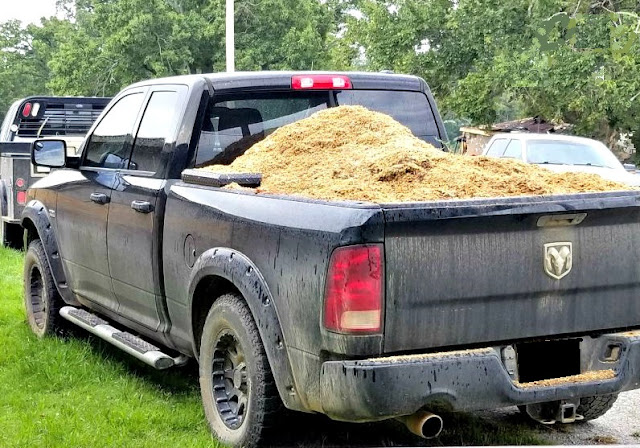
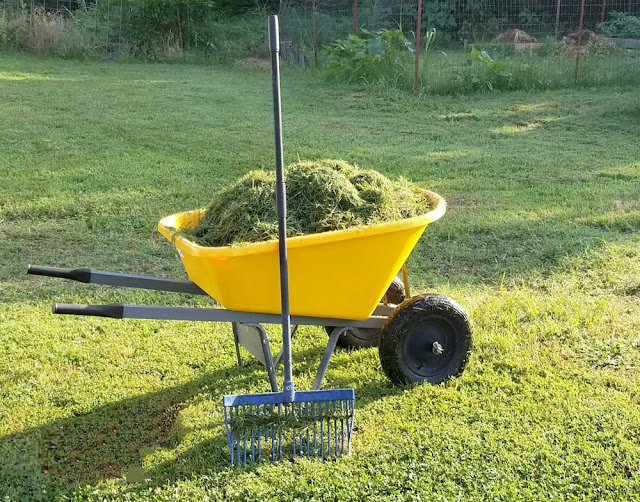
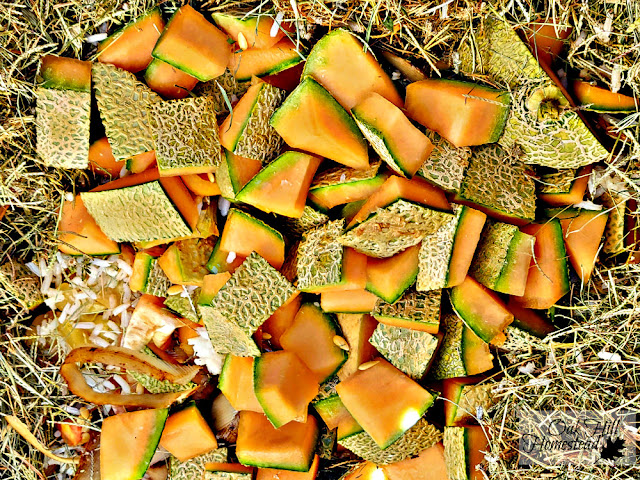
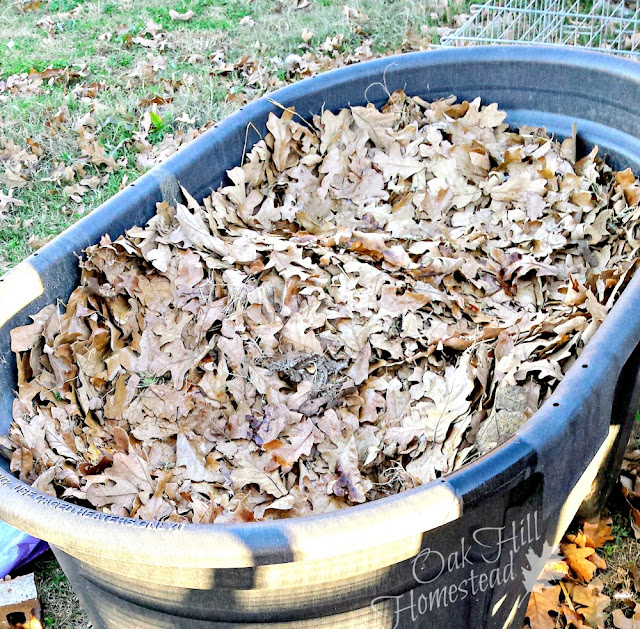
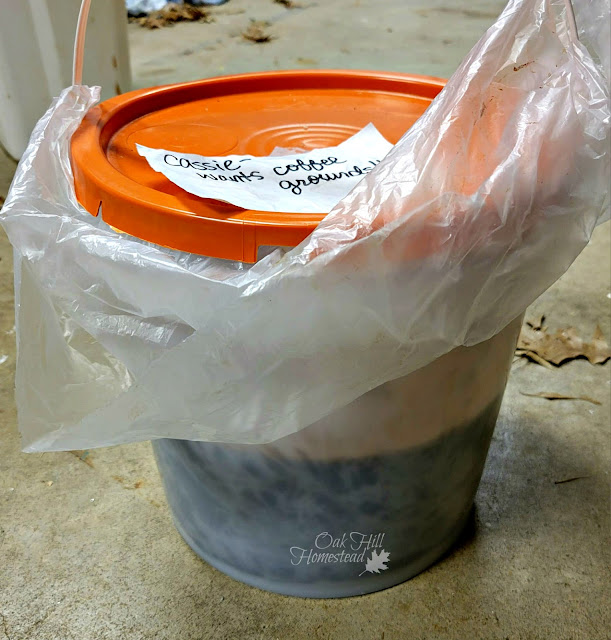

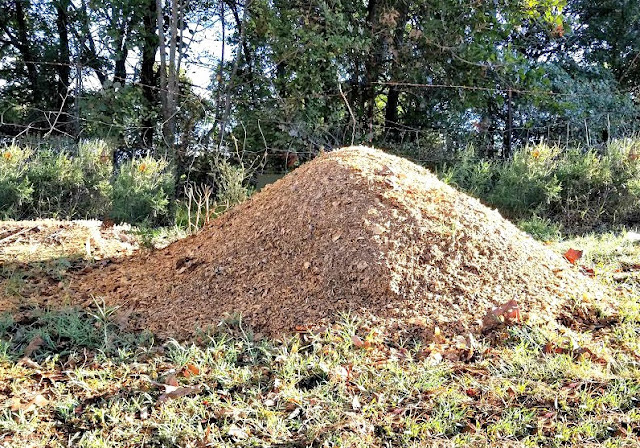

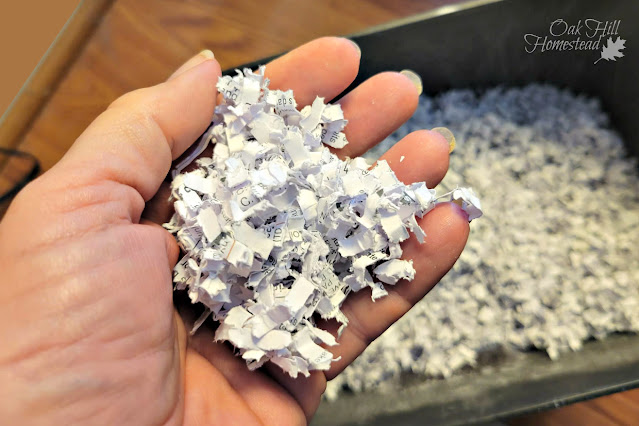




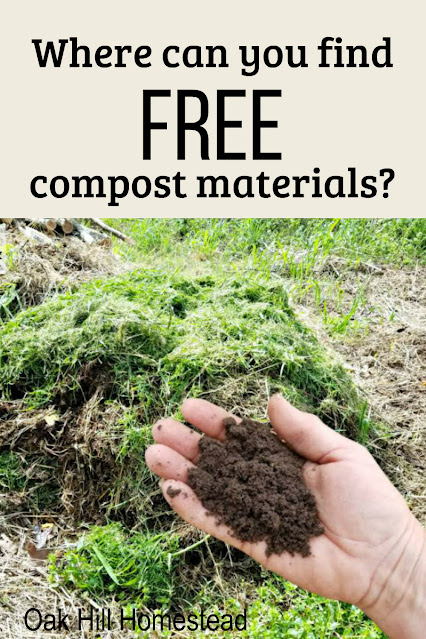
.jpg)












